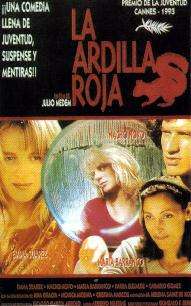The Red Squirrel
| La ardilla roja The Red Squirrel | |
|---|---|
 Movie poster | |
| Directed by | Julio Médem |
| Produced by |
Fernando de Garcillán Enrique López Lavigne |
| Written by | Julio Médem |
| Starring |
Emma Suárez Nancho Novo |
| Music by |
Txetxo Bengoetxea Alberto Iglesias |
| Cinematography | Gonzalo F. Berridi |
| Edited by | María Elena Sáinz de Rozas |
| Distributed by | Colifilms Distribution |
Release dates | 21 April 1993 |
Running time | 114 minutes |
| Country | Spain |
| Language | Spanish, German |
The Red Squirrel (Spanish: La ardilla roja) is a 1993 drama film by the Spanish filmmaker Julio Médem, starring Emma Suárez and Nancho Novo.
Plot
Jota (Novo), a failed musician whose girlfriend has recently left him, is about to commit suicide by jumping off a bridge when a girl on a motorcycle, Sofía (Suárez), crashes off it. Rushing to help her, he discovers she has lost her memory, even forgetting her name. After telling the paramedics and staff at the hospital that she is his girlfriend, he later tells her the same. He invents an entire identity for her, giving her the name Lisa, and a history of their relationship according to his own fantasies. With the hospital psychiatrist starting to become suspicious, he spirits her out of the hospital and away on a trip to the 'Ardilla Roja' campsite, which he claims they have been planning for some while. As their relationship becomes intimate, their behaviour sparks the suspicions of a family of fellow campers (Karra Elejalde and María Barranco) and it becomes clear that Lisa/Sofía's memory is not entirely missing and she is hiding her own past secrets—notably, the existence of a psychotic ex-boyfriend, Félix (Carmelo Gómez), who is rampaging across the country in search of her.
Basque identity
Though Medem is a Basque, and many of his films have dealt explicitly with Basque regional identity, a Basque theme is not apparent in The Red Squirrel. The main characters are played by non-Basques (Suárez is from Madrid, Novo from Galicia, Barranco indelibly Andalusian in popular consciousness after her role in Women on the Verge of a Nervous Breakdown), and much of the action is set at the campsite in La Rioja, a liminal region between the Basque country and Castile.
Nevertheless, touches of Basqueness are apparent. Major characters' names are Basque (Elisa Machinbarrena Fuentes and Jota Fernández Arregui) and place names are given in their Euskera forms rather than Spanish (Donostia for San Sebastián). Attention is given specifically to questions of identity. When Jota checks in at the campsite, for instance, he signs "vasco" (Basque) as his nationality. There are also recurrent echoes of the semi-mythic past that Basque nationalism has reconstructed for the Basque country: video clips of Jota's group Las moscas (The Flies) are reminiscent of the Basque country's supposed pre-Indo-European stone age ancestry; settings including the forest, lake and zoo evoke mythology or ruralised narratives of Basque history. Finally, if violence in a Basque context has a very specific connotation—that of ETA—which is represented in Félix's random violence and self-mutilation, then Lisa/Sofía's amnesia can be read as an attempt on the part of Basque society to forget and escape from the violence of the past and establish a new identity for the Basque country that is not founded around ETA.[1]
References
- ↑ P.J. Smith: "Julio Medem's La ardilla roja (The red squirrel): a transparent society?" in: Cinema, literature and sexuality in Spain and Cuba: 1984-1993 London/New York: Verso, 1996; pp. 128–45.
External links
- The Red Squirrel at the Internet Movie Database
- The Red Squirrel at AllMovie
- The Red Squirrel at Rotten Tomatoes